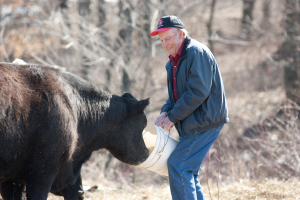
From the heartland — Quadruple bypass frees farmer from years of pain
By Jacob Luecke
This story is featured in the Spring 2013 edition of myBoone Health magazine. Click here for a free subscription.
When you’re running a farm, you can’t let a little pain get in the way of a day’s work.
That’s what Lowell Woods thought five years ago as he was moving cattle from one pasture to another on the 1,300-acre farm he operates with his wife and son in Baring, Mo.
On this day, a few of his cows were being ornery, and Lowell had to hustle to get them to stay moving. As he ran, he felt a sharp pain at the center of his chest.
“That was the first time I noticed it,” Lowell said. “I had to stop and rest a minute but then the pain went away.”
Days later, he was moving hay bales in his barn when the chest pain suddenly came back. Again, he rested and the pain subsided.
And so went the next five years of his life. Every couple days, while doing strenuous work or walking up hills, Lowell would feel the sharp pains. He’d rest and then continue onward.
The thought would creep into his mind that something was probably wrong. But on some days, he felt nothing.
“The reason I put up with this is because I might go a couple days, doing the same kind of work, and not feel any pain in my chest,” he said. “I’d think, ‘this is great, I might be over this.’”
It’s not uncommon for people to ignore pain and other cardiovascular warning signs, said cardiothoracic surgeon Eric Thompson, MD. But that’s a very dangerous behavior.
“With a situation like this, it’s not just that a heart attack could happen. You can die suddenly,” Dr. Thompson said.
He said there are several heart warning signs that should elicit a prompt visit to a family doctor or cardiologist: shortness of breath during exertion, chest pain or discomfort, strange pains in the arms, and pain in neck or back.
When Lowell’s pain kept returning and increasing in intensity, he finally listened to his wife and agreed to come to Boone Hospital Center and get tested.
At Boone, he badly failed a stress test. He was scheduled to come back for a cardiac catheterization, where his cardiologist could look for blockage in his heart.
What they found was shocking — all three of his major coronary arteries were 90-95 percent blocked. He would need quadruple bypass surgery.
The discovery was unwelcome news for Lowell. At 75 years old, he’d already had far more than his share of illness and hospitalization — at just five years old he was nearly killed when a horse stepped on his head, cracking his skull in two places.
Another major operation seemed too much to bear.
 |
|
Lowell and Darlene Woods |
“I was scared to death; I said I couldn’t go through it,” Lowell said. “But I thought about my wife, Darlene. I’ve got the sweetest wife any man could ever have. I thought, I’ve got to do it for her.”
Woods was immediately admitted to the hospital where he awaited his operation the next day.
At 10 a.m., Lowell was taken into the operating room where his operation, performed by Dr. Thompson, which lasted three hours.
The quadruple bypass was a success. To save a heart patient like Lowell, Dr. Thompson said it takes a team effort that extends well beyond the doctors and nurses. The team includes dozens of other hospital employees.
It’s a team that was recently honored by the Society of Thoracic Surgeons with the three star composite quality rating. That’s the society’s highest rating given to only 15 percent of hospitals nationwide.
“To care for a patient after heart surgery, there are probably 50 different people involved, all working together,” he said. “You need all of them; they each play an essential role.”
Dr. Thompson predicts the combined effort will make a profound impact for Lowell.
“His outlook, with his disease as it was, was very poor,” said Dr. Thompson. “Now, after the surgery, his life expectancy should be the same as the average, healthy 75-year-old.”
After his surgery, Lowell spent a day in the intensive care unit and then four days on the cardiac surgery unit. During this time, Darlene stayed by his side. They loved that Lowell’s hospital rooms included space for family members, including a pull-out couch where Darlene could sleep.
“It was wonderful to be able to be right there,” Darlene said. “I never had to leave.”
Lowell agreed.
“I couldn’t imagine going through that without her there with me,” Lowell said. “It is the nicest place you could ever come for health care. It was absolutely perfect. I had the best care that any person could ever have.”
Today, back on their farm in Baring, the surroundings are the same as always.
Lowell and Darlene have been tending to this land for more than 50 years now. They know it by heart. They know the small streams, the rolling pasture and the level crop fields.
But for Lowell, the experience of walking next to his wife and working the land is entirely different.
“Oh, it’s beautiful. I can walk, I have no pain whatsoever,” he said. “I owe it all to the people at Boone hospital — the doctors, the nurses and every one that saved me.”